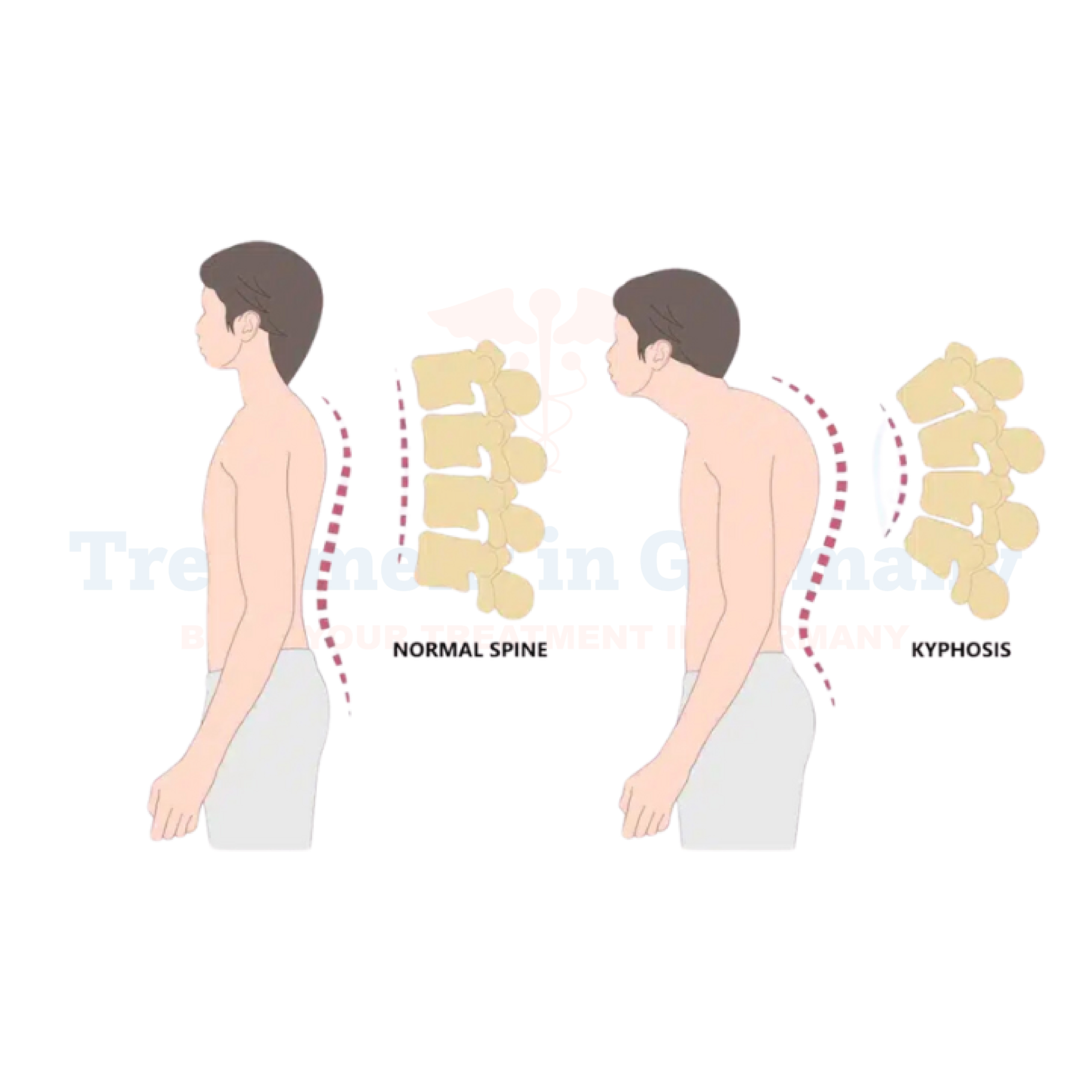Kyphosis Treatment in Germany
Kyphosis is a spinal condition characterized by an excessive outward curvature of the upper back, leading to a hunched or rounded posture. While mild kyphosis may not cause significant health issues, severe cases can result in pain, stiffness, and breathing difficulties. The condition can affect people of all ages but is most common in older adults due to degenerative changes in the spine. Germany is known for its advanced medical care, offering cutting-edge treatments and innovative therapies for kyphosis.
Types of Kyphosis
Kyphosis is classified into different types based on its cause and severity:
- Postural Kyphosis: The most common type, caused by poor posture and weak spinal muscles. It is often seen in adolescents and can be corrected with posture training.
- Congenital Kyphosis: Present at birth due to abnormal spinal development. It may require surgical intervention.
- Scheuermann's Kyphosis: A structural spinal disorder affecting teenagers, where the vertebrae develop abnormally, leading to a rigid curve.
- Degenerative Kyphosis: Occurs due to age-related degeneration of the spine, often seen in older adults with osteoporosis.
- Neuromuscular Kyphosis: Results from underlying neurological conditions like cerebral palsy or muscular dystrophy.
Risk Factors of Kyphosis
Several factors contribute to the development of kyphosis, including:
- Poor Posture: Slouching and prolonged screen time increase the risk.
- Osteoporosis: Weakens bones, making them more prone to fractures and spinal deformities.
- Spinal Injuries: Trauma or fractures can lead to kyphotic curvature.
- Genetic Factors: Family history of kyphosis increases susceptibility.
- Autoimmune Diseases: Conditions like ankylosing spondylitis may contribute to kyphosis.
- Obesity: Excess weight puts additional stress on the spine.
Symptoms of Kyphosis
Kyphosis symptoms vary based on severity and underlying cause. Common signs include:
- Rounded Upper Back: Noticeable forward curvature of the spine.
- Back Pain and Stiffness: Discomfort, especially after prolonged sitting or standing.
- Fatigue: Increased strain on muscles leads to tiredness.
- Limited Mobility: Difficulty in bending or twisting.
- Breathing Issues: Severe kyphosis can compress the lungs, causing shortness of breath.
- Compression Fractures: In advanced cases, spinal fractures may occur.
Diagnosis and Diagnostic Tools
Early diagnosis is crucial for effective treatment. German hospitals use advanced diagnostic techniques, including:
- Physical Examination: Doctors assess posture, flexibility, and spinal alignment.
- X-rays: Determines the degree of spinal curvature.
- MRI (Magnetic Resonance Imaging): Provides detailed images of spinal structures, detecting nerve compression.
- CT (Computed Tomography) Scan: Offers cross-sectional imaging of the spine.
- Bone Density Tests: Evaluates bone strength, especially for osteoporosis-related kyphosis.
- Blood Tests: Helps rule out autoimmune diseases and infections affecting the spine.
Treatment in Germany
Germany is a leader in spinal care, offering world-class treatment options for kyphosis.
Non-Surgical Treatments
- Physical Therapy: Strengthening exercises to improve posture and flexibility.
- Pain Relievers: Medications to reduce discomfort and inflammation.
- Bracing: Helps prevent worsening curvature in growing children and adolescents.
- Complementary Therapies: Acupuncture, chiropractic care, and hydrotherapy.
- Lifestyle Modifications: Weight management and ergonomic adjustments to improve spinal health.
Surgical Treatments
Severe cases of kyphosis may require surgery. German hospitals offer:
- Spinal Fusion Surgery: Stabilizes the spine using metal rods and bone grafts.
- Vertebral Column Resection: Removes affected vertebrae to correct severe deformities.
- Minimally Invasive Procedures: Reduces recovery time and complications.
- Osteotomy: Corrects spinal alignment by cutting and repositioning bones.
Innovative Therapies in Germany
Germany is at the forefront of innovative kyphosis treatments, including:
- Stem Cell Therapy: Investigated for spinal regeneration and repair.
- PRP (Platelet-Rich Plasma) Injections: Promotes healing and reduces inflammation.
- TACE (Transarterial Chemoembolization): Under research for inflammation control.
- Dendritic Cell Therapy: Potential application in autoimmune-related spinal disorders.
- Robot-Assisted Spine Surgery: Enhances precision in surgical procedures.
- 3D-Printed Spinal Implants: Customized solutions for spinal deformities.
Why is it Preferable to Get Treatment in Germany?
Germany is a top destination for kyphosis treatment due to:
- World-Class Hospitals: Equipped with cutting-edge technology.
- Highly Experienced Spine Specialists: Expertise in complex spinal conditions.
- Innovative Treatment Approaches: Advanced therapies for improved outcomes.
- Personalized Rehabilitation Programs: Tailored recovery plans for each patient.
- Comprehensive Medical Care: Multidisciplinary approach to spinal health.
- High Success Rates: Proven track record in kyphosis treatment.
Solutions and Prevention
Preventing kyphosis involves maintaining a healthy spine through:
- Regular Exercise: Strengthening core and back muscles.
- Proper Posture: Avoiding slouching and maintaining spinal alignment.
- Balanced Diet: Ensuring adequate calcium and vitamin D intake.
- Weight Management: Reducing stress on the spine.
- Routine Medical Checkups: Early detection and treatment of spinal conditions.
- Ergonomic Workspaces: Adjusting seating and screen height for better posture.
Conclusion
Kyphosis is a spinal disorder that can impact posture, mobility, and overall health. Germany offers world-class treatment options, from non-invasive therapies to advanced surgical interventions, ensuring optimal recovery for patients. With highly skilled doctors, state-of-the-art hospitals, and groundbreaking medical innovations, Germany remains a leading destination for kyphosis treatment. Early diagnosis and preventive measures can help individuals maintain a healthy spine and improve their quality of life.
👉 Contact us for further information and receive a complimentary consultation.


.webp)
 (1).webp)

.webp)
 (1).webp)


.webp)
 (1).webp)

.webp)
 (1).webp)
